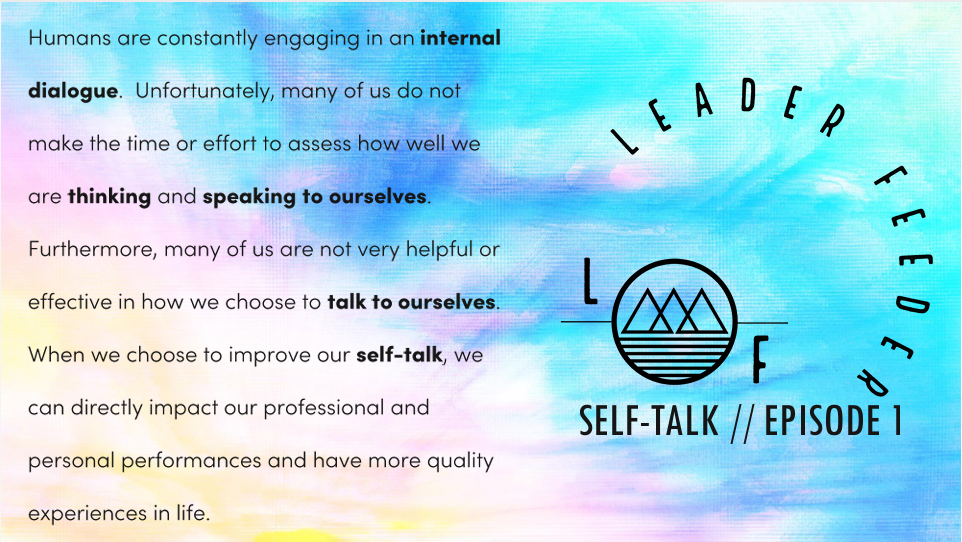umans are constantly engaging in an internal dialogue, yet many of us fail to take the necessary time and effort to evaluate the quality of our self-talk. This often results in ineffective and unhelpful communication with ourselves. However, by actively seeking to improve our self-talk, we can directly enhance both our personal and professional performances, leading to more fulfilling experiences in life.
Our internal dialogue extends beyond fleeting thoughts, offering valuable insights into our beliefs and self-perception, as well as our views of others and the world around us. Furthermore, the way we speak to ourselves has a profound impact on our physiology, confidence, interpersonal relationships, and well-being. Unfortunately, many of us are tuned out to the influence of our self-talk on our personal and professional lives, prompting the question: Is it not time we become more attuned to it?
The Problems
Our thoughts and beliefs can become a self-fulfilling prophecy. For example, if you tell yourself, “I can’t do this,” it’s unlikely that you will put forth the levels of effort and dedication needed get the results you are aiming for. In turn, poor results and failure go on to confirm your initial thoughts: “See, I knew I couldn’t do it!”
Ineffective thinking and self-talk can turn repetitive and patterned. Patterns in our thoughts and self-talk, once established, become automatic and more difficult to challenge in the heat-of-the-moment.
Ineffective self-talk tends to be associated with adverse internal (e.g., higher anxiety) and external (e.g., lower-quality performances) outcomes that make it difficult to thrive and excel at work.
How did we get here?
Many of us are overly critical of ourselves. While self-reflection and maintaining high standards for ourselves are often helpful and healthy practices, we can go overboard and unfairly punish ourselves verbally when things don’t go well or as planned.
When we doubt our capabilities, it’s natural for our thoughts and internal speech to reflect this held belief. Unfortunately, ineffective internal dialogue can easily spiral downward, even when there is no evidence or rationale for our (degree of) doubt.
Self-talk is done internally and often is not observable or accessible to outside entities. This means, our internal thoughts and dialogue can remain hidden and shielded from others. Others who may be able to directly challenge our views and provide an alternative (and potentially more accurate) perspective.
Benefits of effective self-talk
Research has found the following benefits are associated with effective self-talk:
- Increased confidence and self-esteem
- Improved performance outcomes and results
- Better able to cope with emotions and mental stress
- Increased optimism and resilience
- Increased motivation and engagement
- Higher levels of reported fun
- Less performance anxiety
Try these strategies to combat negative self-talk
Strategy #1: Inspect your thoughts
Our words are powerful. Too often we aren’t even aware of our words; and therefore, failing to harness the power they hold!
Catch distortions and flawed thinking patterns
Research is clear, humans are prone to thinking in flawed and inaccurate ways. It’s hypothesized our brains have evolved to distort reality as a way to cope with prolonged stress and enhance survival (e.g., worst-case scenario thinking can identify potential threats).
Distorted thinking over time can lead to ineffective thinking patterns. Ineffective thinking patterns have been associated with poor or unhelpful professional outcomes such as faulty decision making, increased anxiety and rumination, higher susceptibility to burnout, and high interpersonal conflict.
Where to start: At strategic times throughout your day (e.g., before/after meetings, after receiving feedback, analyzing data, etc.), stop and assess if your thoughts are falling into any of the following distorted thought patterns:
- All-or-nothing thinking — The tendency to view a situation in either/or, extreme terms. (e.g., “If they cancel this project, then none of my work here matters.”)
- Catastrophizing — Jumping to the worst-case scenario. (“He says he has difficult news; I bet we’re all going to get fired!”)
- Overgeneralizing — Taking an incident or isolated experience and generalizing too broadly. (e.g., “They never take me seriously.”)
- Labeling – Branding ourselves with unfair and ugly characterizations. (e.g., “I’m so incompetent and don’t deserve this job.”)
Strategy #2: Become a coach
When dialoguing with others, we often take a coaching approach that provides them with ample support and helpful feedback. However, when we talk to ourselves, we take off our coaching hat and put on a critic’s hat.
Make a constructive shift
When our internal dialogue turns self-defeating, low quality, or stuck in the past, it can negatively impact how we perform and feel at work. Furthermore, research has found that leaders who used dysfunctional self-talk were cited by their staff as struggling to embrace change, less creative, and less resilient in managing setbacks and hardships.
Shifting our self-talk and using language that is future-focused, moving towards goals, and constructive can lead to more optimal outcomes and less job strain.
Where to start: Use coach-like tactics to improve your self-talk.
- Use second- or third-person perspective—When engaging in self-talk, eliminate “me/my/myself/I” and replace them with “you/your/your name.” Using second- and third-person self-talk frames the message as coming from an outside source (such as a coach) and helps to depersonalize the information and avoid subjectivity.
- Speak in terms of growth and development—Ask yourself if your self-talk is helping you move closer to your goals. If not, pause and reword your message to meet this criteria. (e.g., “You didn’t hit the mark this time, moving forward you will do….”)
- Reject being a Pollyanna—The best coaches do not avoid reality or live in the past. Rather, they hold firm to their vision and focus on what’s next. Effective self-talk aims to support where we’re going and how we’re going to get there.
Strategy #3: Build on what’s right
It’s natural for our thoughts to turn to the negative and what’s going wrong for us. However, the most effective self-talk builds on our wins and what’s going right in life. As a result, our self-image and confidence is enhanced, which can elevate our work output and increase our professional opportunities.
Relish compliments
- When others provide us with praise and acknowledgment, trust them! We can get in the habit of brushing off others’ feedback because we’re convinced they were just being nice or it was done out of obligation. Instead of quickly dismissing compliments, savor these moments and visualize the messages being passed to you.
Clean the lens
Our negative self-talk can cloud the lens in which we see ourselves, others, and the world. With effort, we can revamp our self-talk and see life more clearly.
Where to start: Building more effective self-talk means enriching our thoughts through intentional, daily practices.
- Three good things—At the beginning or end of each day, take a few minutes to identify and re-experience three good things that happened at work within the last 24 hours. Then, summarize how these good things can be repeated, how they positively impact your work, and how they can be used in your self-talk moving forward.
Using these strategies, we can empower ourselves to transform our self-talk into a powerful tool for positive change. By examining our thoughts, recognizing, and correcting distorted thinking patterns, and adopting a coaching mindset toward ourselves, we can break free from self-doubt and criticism. As we embark on this journey of self-awareness and self-improvement, armed with the tools to reshape our internal dialogue, we open doors to realizing our full potential in both our personal and professional lives.
Jessica Burgett
How can we put compassion for ourselves and others at the center of what we do? Second year medical student Tanner Nelson interviews pediatric ophthalmologist Griffin Jardine to share how he helps to install hope and compassion with his patients, and himself.
Understanding the dangers of toxic productivity is crucial in safeguarding mental well-being and fostering a balanced life amid today's demanding work culture. Jess Burgett, Leadership Training Specialist, shares a healthier approach to not only shield against burnout but also empowers individuals to achieve sustainable success and fulfillment.
We have personal protective equipment (PPE) for our body–but what about our mind? Huntsman Cancer Institute nurse manager Cassidy Kotobalavu has lead training on the concept of emotional contagion–how good (and bad) emotions spread. Here are Cassidy’s expert tips (with slides) on managing emotional contagion in health care.

